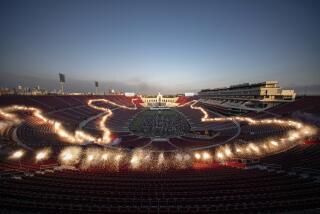Costa Mesa Noise Case : Amphitheater’s Sound System Still Untested
- Share via
A heavy metal singer’s voice problem will keep the Pacific Amphitheatre’s neighbors from finding out this weekend whether a new theater sound system is the answer to their noise problem.
The Pacific’s new, rented digital sound system is designed to beam sound so that it stays inside the amphitheater instead of surging into the surrounding Costa Mesa neighborhood, where residents’ noise complaints have prompted an ongoing court battle.
Poison’s concert Saturday night was to have been the first hard-rock show of the amphitheater’s 1989 season, and the high-decibel band and its opening act, Tesla, promised to put the new system to the acid test. But the show was canceled Wednesday after Poison’s singer, Bret Michaels, injured his vocal cords while on tour.
Before Michaels’ case of bruised vocal cords forced the band to skip its remaining April shows, Poison was planning to use the Pacific Amphitheatre’s new house sound system, according to a spokeswoman for the band’s management company.
Alabama, the country-pop group that opens the amphitheater’s season tonight, will use its own sound equipment, said a spokeswoman at the band’s office in Nashville. Rod Stewart’s management said he also plans to use his own sound equipment when he plays the amphitheater April 14 and 15.
That means the new equipment will remain untested before the parties are scheduled to go back to court on April 14 to give Superior Court Judge Richard M. Beacom a status update.
Neighbors have sued over what they contend has been excessive concert noise from the amphitheater since it opened in 1983. The amphitheater’s lawyers deny that the sound is excessive.
After 6 weeks of testimony last summer, Beacom halted the noise trial and asked both sides to come up with a solution that might settle the dispute. The amphitheater’s answer is the new sound system, which they describe as a “good neighbor” gambit intended to address neighbors’ complaints through high-technology. Performers, however, still have the option of using their own sound equipment rather than the house system, according to Alex Hodges, West Coast vice president in charge of concerts for the Nederlander Organization, which built and operates the amphitheater.
“We’re experimenting with something the court asked us to try to solve a community situation,” Hodges said. “If the bands want to use their own system, they use the production they have on the road.” It is common for major touring pop acts to travel with their own sound and lighting equipment.
The Pacific’s new audio setup “is the most expensive system in the United States and one of the best, we understand,” said Deborah M. Nesset, one of the amphitheater’s lawyers in the noise lawsuit. “We hope that’s encouragement” for performers to use the house sound equipment, she said.
Last week, before Poison had canceled its show, the band’s spokeswoman said the group “would normally use its own system” but had decided to use the Pacific’s sound system “because of scheduling and logistics.” Poison’s regular sound system was to be sent on to Phoenix, making it cheaper and easier to set up for the next night’s show.
Richard L. Spix, lawyer for the residents who have sued the Pacific Amphitheatre, is hoping the new sound technology will allow a mutually happy ending to a case that has dragged on since 1984.
“If we can get the bands to trust the system and we can get the residents to trust the system, then aren’t we done?”
But if the system proves inadequate, or if performers refuse to use it, Spix said, “I would have to see what else (amphitheater management) is willing to do and assess whether that has the potential to result in compliance” with Orange County noise standards.
One key issue in the trial is just how loud Pacific Amphitheatre shows sound in the surrounding neighborhood. Spix says that monitoring done by the neighbors’ own experts and court-appointed experts from the Orange County Health Agency have shown that about three-fourths of all amphitheater concerts shower residences to the north with excessive noise.
The amphitheater lawyers, who dispute those findings, have agreed to install sound-monitoring devices at several fixed locations in the surrounding neighborhood, including one outside the home of Laurie Lusk, the official plaintiff in the case.
But Spix accused the amphitheater management of dragging its feet in setting up the monitoring stations.
“Delay is in their favor,” he said. “They know that a sophisticated sound-monitoring device will tighten the lid on their coffin” by confirming excessive concert noise levels.
Nesset denied any stall tactics. “It will take time,” she said. “It’s complex (equipment).”
Spix admitted to frustration over the amount of time it has taken for the neighbors to bring their case to court and get a resolution. He also expressed doubts that Beacom would be willing to order a cap on amphitheater sound output.
“This is Orange County. Judicial activism is not looked on favorably,” Spix said. “And a judge that says, ‘Go in and turn down their sound’ doesn’t sound very Orange County-ish to me.”
Nesset said an order limiting the Pacific Amphitheatre’s sound output would cripple the amphitheater by scaring away rock performers who demand full control over their sound. The Pacific Amphitheatre, with its capacity of 18,764, is locked in a hotly contested battle for attractions and concert fans with the rival Irvine Meadows Amphitheatre, a similar outdoor concert venue 11 miles to the south.
More to Read
Sign up for Essential California
The most important California stories and recommendations in your inbox every morning.
You may occasionally receive promotional content from the Los Angeles Times.














